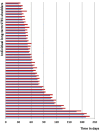Do asymptomatic STEC-long-term carriers need to be isolated or decolonized? New evidence from a community case study and concepts in favor of an individualized strategy
- PMID: 38699424
- PMCID: PMC11064650
- DOI: 10.3389/fpubh.2024.1364664
Do asymptomatic STEC-long-term carriers need to be isolated or decolonized? New evidence from a community case study and concepts in favor of an individualized strategy
Abstract
Asymptomatic long-term carriers of Shigatoxin producing Escherichia coli (STEC) are regarded as potential source of STEC-transmission. The prevention of outbreaks via onward spread of STEC is a public health priority. Accordingly, health authorities are imposing far-reaching restrictions on asymptomatic STEC carriers in many countries. Various STEC strains may cause severe hemorrhagic colitis complicated by life-threatening hemolytic uremic syndrome (HUS), while many endemic strains have never been associated with HUS. Even though antibiotics are generally discouraged in acute diarrheal STEC infection, decolonization with short-course azithromycin appears effective and safe in long-term shedders of various pathogenic strains. However, most endemic STEC-strains have a low pathogenicity and would most likely neither warrant antibiotic decolonization therapy nor justify social exclusion policies. A risk-adapted individualized strategy might strongly attenuate the socio-economic burden and has recently been proposed by national health authorities in some European countries. This, however, mandates clarification of strain-specific pathogenicity, of the risk of human-to-human infection as well as scientific evidence of social restrictions. Moreover, placebo-controlled prospective interventions on efficacy and safety of, e.g., azithromycin for decolonization in asymptomatic long-term STEC-carriers are reasonable. In the present community case study, we report new observations in long-term shedding of various STEC strains and review the current evidence in favor of risk-adjusted concepts.
Keywords: EHEC; HUS; STEC; Shigatoxin; fecal shedding; long-term carriage; social restrictions; socio-economic burden.
Copyright © 2024 Sayk, Hauswaldt, Knobloch, Rupp and Nitschke.
Conflict of interest statement
The authors declare that the research was conducted in the absence of any commercial or financial relationships that could be construed as a potential conflict of interest.
Figures



Similar articles
-
Association between azithromycin therapy and duration of bacterial shedding among patients with Shiga toxin-producing enteroaggregative Escherichia coli O104:H4.JAMA. 2012 Mar 14;307(10):1046-52. doi: 10.1001/jama.2012.264. JAMA. 2012. PMID: 22416100
-
Comparative Genomics of Shiga Toxin-Producing Escherichia coli Strains Isolated from Pediatric Patients with and without Hemolytic Uremic Syndrome from 2000 to 2016 in Finland.Microbiol Spectr. 2022 Aug 31;10(4):e0066022. doi: 10.1128/spectrum.00660-22. Epub 2022 Jun 22. Microbiol Spectr. 2022. PMID: 35730965 Free PMC article.
-
Hemolytic uremic syndrome due to Shiga toxin-producing Escherichia coli infection.Med Mal Infect. 2018 May;48(3):167-174. doi: 10.1016/j.medmal.2017.09.012. Epub 2017 Oct 18. Med Mal Infect. 2018. PMID: 29054297 Review.
-
Unusual severe case of hemolytic uremic syndrome due to Shiga toxin 2d-producing E. coli O80:H2.Pediatr Nephrol. 2017 Jul;32(7):1263-1268. doi: 10.1007/s00467-017-3642-3. Epub 2017 Mar 25. Pediatr Nephrol. 2017. PMID: 28343354 Free PMC article.
-
Hemolytic uremic syndrome: differential diagnosis with the onset of inflammatory bowel diseases.Acta Biomed. 2018 Dec 17;89(9-S):153-157. doi: 10.23750/abm.v89i9-S.7911. Acta Biomed. 2018. PMID: 30561409 Free PMC article.
Cited by
-
Intestinal Carriage of Two Distinct stx2f-Carrying Escherichia coli Strains by a Child with Uncomplicated Diarrhea.Pathogens. 2024 Nov 15;13(11):1002. doi: 10.3390/pathogens13111002. Pathogens. 2024. PMID: 39599555 Free PMC article.
References
-
- Robert Koch Institute , Department for Infectious Disease Epidemiology. Report: Final presentation and evaluation of epidemiological findings in the EHEC O104:H4 outbreak, Germany 2011. Berlin (2011), Available at 10.25646/88. - DOI
-
- Vonberg RP, Höhle M, Aepfelbacher M, Bange FC, Belmar Campos C, Claussen K, et al. . Duration of fecal shedding of Shiga toxin-producing Escherichia coli O104:H4 in patients infected during the 2011 outbreak in Germany: a multicenter study. Clin Infect Dis. (2013) 56:1132–40. doi: 10.1093/cid/cis1218, PMID: - DOI - PubMed
Publication types
MeSH terms
Substances
LinkOut - more resources
Full Text Sources
Medical

